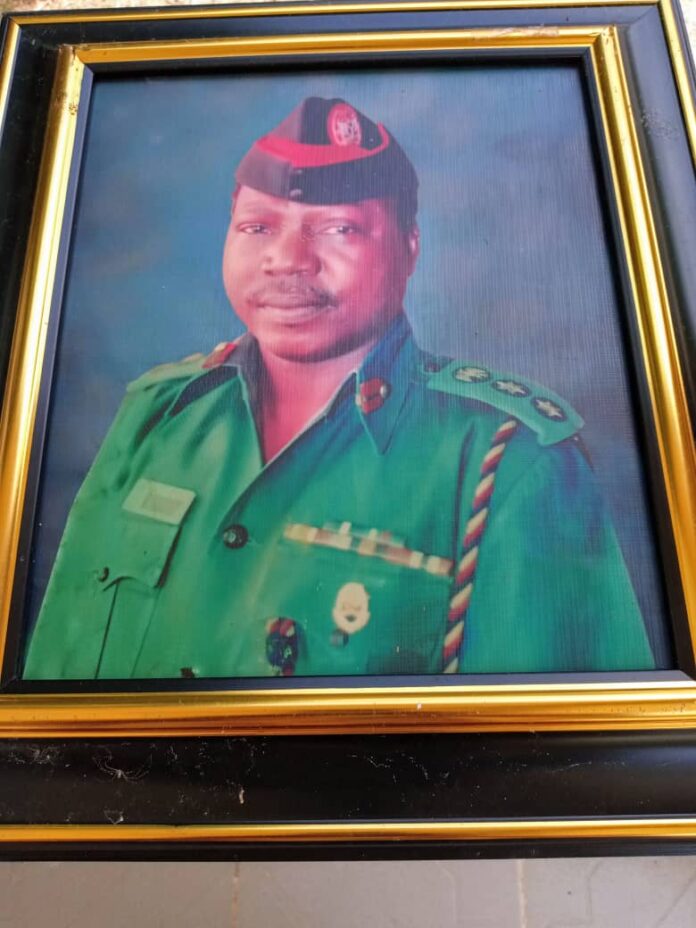By Stanley Ojah
The humid night air hung heavy over Kaduna as Colonel Olusegun Oloruntoba was roused from sleep by an urgent pounding on his door. Before he could fully comprehend the situation, armed soldiers burst in, their faces obscured by the shadows of their berets.
The date was March 1995, marking the beginning of a 1,460-day nightmare for one of Nigeria’s most distinguished military engineers.
No warrant. No explanation. Just the cold, metallic click of handcuffs snapping shut around Oloruntoba’s wrists.
“You are under arrest for treason.”
Treason? The word echoed in his mind. As they roughly handcuffed him, Oloruntoba’s mind raced through his 23 years of impeccable service. Hadn’t he just received a commendation weeks before for his work on indigenous weapons systems? How could a man who dedicated his life to strengthening Nigeria’s defence capabilities suddenly become an enemy of the state? What followed was a nightmare of torture, solitary confinement, and a death sentence—all for “a coup that never existed.”
This is his story. This is where President Bola Tinubu comes in.
Olusegun Oloruntoba’s journey began in the modest town of Okoro-Gbedde, Kogi State, where he was born on June 15, 1951. The son of a civil servant and a teacher, young Olusegun demonstrated exceptional academic prowess at the Provincial Secondary School in Okene. His physics teacher, Mr. Adebayo, often remarked, “This boy will either become a great scientist or a great soldier.” As fate would have it, he would become both.
The Nigeria-Biafra civil war (1967-1970) left an indelible mark on the teenage Olusegun. While he was too young to enlist, the conflict ignited his patriotic fervour and convinced him that Nigeria needed not just warriors but technically competent officers who could develop indigenous military solutions.
Oloruntoba’s military career began in January 1972 when he was admitted into the Nigerian Defence Academy’s Regular Combatant Course 11. His exceptional performance earned him early recognition, with Commandant Major General E.O. Ekpo noting in his evaluation: “Cadet Oloruntoba combines rare analytical skills with physical endurance – a complete officer material.”
After commissioning, the young officer pursued a degree in mechanical engineering at Ahmadu Bello University, Zaria, graduating with honours in 1978. His superior officers quickly recognised his technical acumen, posting him to the Army School of Electrical and Mechanical Engineering.
The British government soon took notice of this brilliant Nigerian officer, offering him a scholarship to Cranfield Institute of Technology (now Cranfield University), where he earned a Master’s in Industrial Engineering and Production Management (1981-1983). During this period, he became one of the first Nigerian officers to be registered as a Chartered Engineer by the British Engineering Council.
Returning to Nigeria, Major Oloruntoba (as he was then) embarked on what would become his most significant contribution to Nigeria’s military: the indigenisation of weapons production. His crowning achievement came in 2004 when he led the team that produced Nigeria’s first locally manufactured 60mm mortar tubes, 81mm mortar tubes and rocket-propelled grenade launchers (RPG7)
For this feat, he received the Defence Industries Corporation of Nigeria’s Merit Award. Colonel D.J. Abdullahi (retd.), who worked with him on the project, recalls, “Oloruntoba would work 20-hour days, often sleeping in the workshop. His dedication was unmatched.”
Simultaneously, he excelled in military training, serving as Directing Staff at the prestigious Command and Staff College, Jaji. His lectures on military engineering became required reading for up-and-coming officers.
The annulment of the June 12, 1993, elections proved to be the turning point in Oloruntoba’s military career. At a commanders’ meeting convened by his GOC, Brigadier General Ahmed Baku, Oloruntoba voiced what many junior officers feared to say: “With all due respect, sir, if the Head of State has genuine reasons for annulling this election, he owes Nigerians an explanation. If not, Professor Nwosu should be allowed to announce the results.”
The room fell silent. Colonel Jibril (retd.), who was present, later recounted: “We all agreed with Oloruntoba, but he was the only one brave enough to say it openly. That was the day I knew his military career was in jeopardy.”
True to form, Oloruntoba was quietly reassigned to teaching duties at the Staff College – a move considered a demotion in military circles. Unknown to him, this was merely the prelude to a more sinister plot.
The “coup” allegations emerged in March 1995. General Sani Abacha’s regime claimed to have uncovered a plot involving over 40 military officers and civilians. Oloruntoba’s name appeared on the list, with the allegation that he was to lead the assault on Aso Rock.
“They claimed I was to capture Abacha,” said Oloruntoba. “Me? A man who had never even been to Abuja?”
Retired Colonel P.N. Okeke, who served on the investigative panel, revealed in a 2018 interview: “There was no concrete evidence against most of the accused, especially Oloruntoba. But the atmosphere was such that anyone who had ever questioned the regime was suspect.”
What followed was an unspeakable descent into the abyss. Oloruntoba said he was subjected to sensory deprivation in solitary confinement, suspension torture (hung by limbs for hours), sleep deprivation, and psychological torture, including mock executions. He was suspended like a slaughtered animal, his left hand tied to his left leg, hanging for hours. Beaten, starved, psychologically broken, all to force a false confession.
Dr. Femi Odekunle, who later served on the Oputa Panel, documented that Oloruntoba’s medical reports showed “severe ligament damage in wrists and ankles consistent with suspension torture.”
Yet through it all, the colonel maintained his defiance. Captain Y. Bello (retd.), a prison guard at the time, remembers: “Even after torture sessions, Colonel Oloruntoba would walk back to his cell singing. He became a symbol of resistance for other detainees.”
Sentenced to death alongside Obasanjo, Yar’Adua, and others. Yet, he never broke.
“When they lowered me, I walked out singing—‘Who go suffer? Na dem go suffer!’”
The special military tribunal was a foregone conclusion. Without access to proper legal defence, all accused were found guilty. Oloruntoba received a death sentence alongside General Olusegun Obasanjo, General Shehu Musa Yar’Adua, Major General Abdulkarim Adisa and 35 others. International outcry followed, with Amnesty International declaring the trial “a gross miscarriage of justice.” The UK Engineering Council petitioned the Nigerian government, highlighting Oloruntoba’s significant contributions to the field of engineering.
For four years, Oloruntoba languished in detention. The turning point came with Abacha’s sudden death in June 1998. General Abdulsalami Abubakar, recognising the grave injustice, ordered the immediate release of all phantom coup detainees, restoration of their military ranks, payment of all withheld entitlements and counting detention years as active service.
The Human Rights Violations Investigation Commission (Oputa Panel) conclusively established that the 1995 coup was fabricated. Its recommendations included an official apology from the Federal Government, monetary compensation for victims, and institutional reforms to prevent recurrence.
Despite these recommendations and personal assurances from President Obasanjo, no concrete action was taken. Oloruntoba reflects bitterly: “The same man who suffered with us became president and forgot us. That betrayal hurt more than the torture.”
Post-retirement, Oloruntoba channelled his intellect into academia, serving as Lecturer I at the University of Ilorin’s Mechanical Engineering Department and as Lecturer I at the Nigerian Defence Academy, as well as a consultant to the Defence Industries Corporation.
Today, Oloruntoba wears a different crown, HRM Oba (Col.) Olusegun Oloruntoba is the Olugbede of the Gbede Kingdom, a first-class traditional ruler. His palace is a sanctuary of wisdom, where he blends military discipline with royal diplomacy. He was crowned in 2010. As monarch, he has established vocational training centres, pioneered community policing initiatives and advocated for educational reforms. Yet, the past lingers.
Now in his 70s, Oloruntoba continues to seek redress, including the full implementation of the Oputa Panel recommendations, official exoneration in military records, and compensation for years of wrongful detention. His legal team, led by Chief Mike Ozekhome (SAN), has filed multiple petitions to successive governments, all of which have been ignored. “Nigeria owes us. Not just money, but a recognition that we were wronged,” said Oloruntoba. Oloruntoba believes the incumbent president can excel where others excuse themselves. Is this June 12, the phantom coup plotters’ final redemption day?
Stanley is a writer and an analyst based in Lagos, Nigeria.





Yayla su kaçak tespiti Ortaköy su kaçağı tespiti: Ortaköy’de su kaçağını nokta atışıyla tespit ediyoruz. https://tortik.ck.ua/author/kacak/